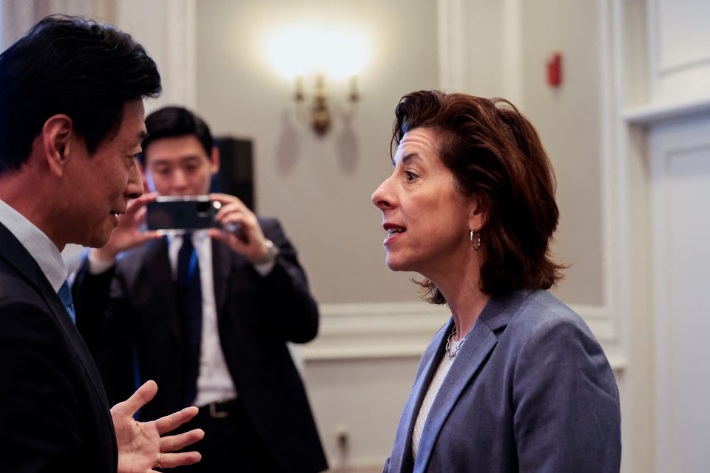Trade ministers of 14 countries in the US-led Indo-Pacific Economic Framework (IPEF) reached their first tangible deal after year-long negotiations, “substantially” completing talks on supply chains resilience, the US Commerce Department said on Saturday.
The “first of its kind” agreement calls for countries to form a council to coordinate supply chain activities and a “Crisis Response Network” to give early warnings to IPEF countries on potential supply disruptions, US Commerce Secretary Gina Raimondo told a press conference in Detroit.
The deal provides an emergency communications channel for IPEF countries to seek support during supply chain disruptions, coordinate more closely during a crisis and recover more quickly.
Also on AF: US Says ‘Won’t Tolerate’ China’s ‘Coercive’ Micron Chip Ban
The supply chains agreement also includes a new labor rights advisory board aimed at raising labor standards in supply chains, consisting of government, worker, and employer representatives.
Supply chains negotiations are one of four “pillars” of the IPEF, which represents the Biden administration’s main economic initiative in Asia. It is aimed, in part, at providing countries in the region with an alternative to closer ties with China.
China is not part of the IPEF discussions, but participated in Asia Pacific Economic Cooperation (APEC) trade talks in Detroit, which wrapped up on Friday with a pledge for more inclusive trade but no joint statement.
CHIPS Act benefit
The other three IPEF pillars — trade, climate transition, and labor and inclusiveness — are more complex and expected to take longer to negotiate. But US officials are aiming for more results by the time of the APEC leaders summit in San Francisco in November.
Raimondo also said the IPEF agreement on supply chains and other pillars of the talks would be consistent with US investments in the $52 billion CHIPS Act to foster semiconductor production in the United States.
“The investments in the CHIPS Act are to strengthen and bolster our domestic production of semiconductors. Having said that, we welcome participation from companies that are in IPEF countries, you know, so we expect that companies from Japan, Korea, Singapore, etc, will participate in the CHIPS Act funding,” Raimondo said.
IPEF goals ‘misunderstood’
IPEF’s trade pillar does not include negotiations over tariff reductions or other market-access aspects of traditional free trade deals, but aims for common rules on agriculture, labor, environmental standards and trade facilitation.
US Trade Representative Katherine Tai, along with Raimondo, pushed back against complaints from US farm and industry groups that IPEF lacks market access improvements, putting it at a disadvantage to other trade deals in the region, including one led by China.
Raimondo said that view reflects a “misunderstanding” of IPEF’s goals.
Tai added that IPEF “from the very beginning, is not a traditional trade deal. We’re not just trying to maximize efficiencies and liberalization. We’re trying to promote sustainability, resilience and inclusiveness.”
“We have more work to do but I am confident that we will start seeing results under Pillar 1 in the months ahead,” Tai said.
- Reuters, with additional editing by Vishakha Saxena
Also read:
Japan and US Agree to Cooperate on Advanced Technology
China Says it Will Strengthen Chip Ties With South Korea
US, China Ministers Hold ‘Candid’ Talks on Trade Concerns
China’s Micron Ban Adds to Asian Chipmakers’ Investment Woes
US Risks ‘Enormous Damage’ With China Chip War: Nvidia CEO
Tech Supply Chains Will Shape Politics For Decades: Intel – CNN
























